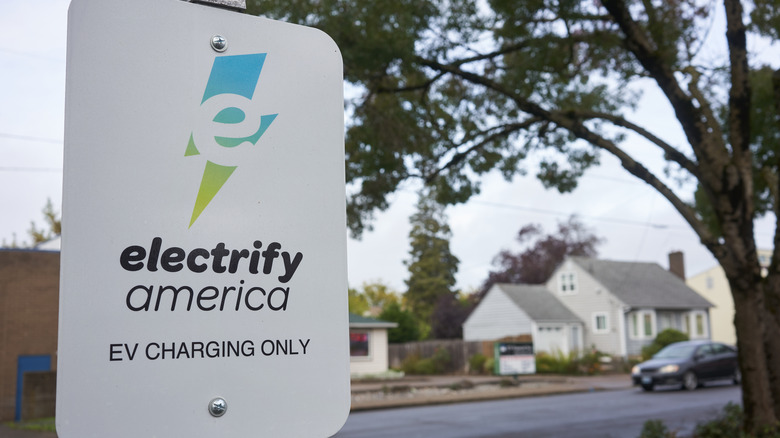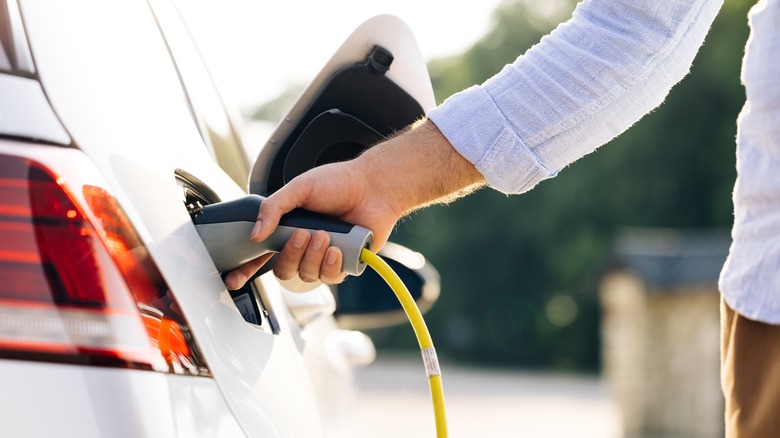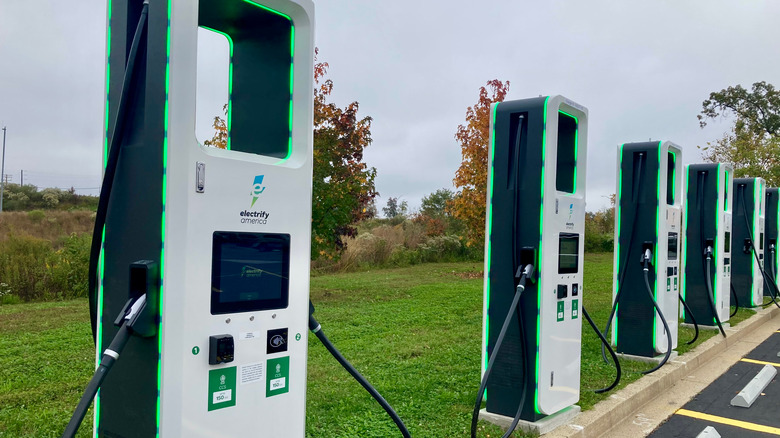Electrify America Price Increases Are About To Make Fast-Charging Your Car More Expensive
Electrify America is the largest public fast charging network in the country, with over 3,400 fast chargers and 791 operational stations (via Electrify America). Bluedot reports that the average charging station prices of a top off at roughly $0.40 to $0.70 per kWh, making the typical charge at a public station about $30 to $40. In contrast, Kelley Blue Book reports the average electricity price of a residential customer at $0.16 per kWh.
With all these factors in mind, EV owners who regularly use public charging infrastructure to manage their car's range need to know that Electrify America is set to raise its rates in March 2023.
In an email sent out to customers of EA, the brand notes: "We've tried hard to maintain our current pricing, but rising operational and energy costs have now made adjusting our pricing necessary. We shall continue to maintain simple, uniform pricing across the country, and this adjustment ensures we can uphold our commitment to drive electric vehicle (EV) adoption and the future of electric mobility."
The price changes will affect both the fast chargers and the per-minute costs across charging levels.
Prices will increase slightly on March 6, 2023
According to Electrify America, the current price for California Guest and Pass Members is $0.43 per kWh (with a reduction to $0.31 for Pass+ Members who pay the additional $4 monthly fee). As of March 6, 2023, the price will increase to $0.48 per kWh. This translates into a few additional dollars for each recharge, but the company will also be raising the per-minute price from $0.16 to $0.19 for up to 90kW, and from $0.32 to $0.37 for up to 350 kW. These translate into a noticeable boost in cost for the typical EV user.
More significantly, these price increases disproportionately impact renters and other owners who don't have charging equipment installed in their homes. Relying on public charging infrastructure means relying on electricity prices, which can and do fluctuate significantly based on a variety of external factors. Fortunately, there are some options out there for EV owners who are less-than-enthusiastic about this rate increase.
Alternatives that drivers should consider
One important resource that EV owners can take advantage of is free charging stations. Free charging negates the cost of a top off entirely. Whenever you can plug your vehicle in and boost its range without paying for it, you obviously should.
Free charging infrastructure can be found all over the United States, so perusing a map of free sites in your local area can give you an important lead on where to beat the prices. You might even find a location on your daily commute, meaning you can stop for 10 minutes to plug in on the way home every few days. The effective range of an EV far exceeds the daily demand of the average driver, so this might be the perfect way to drastically reduce your ownership costs, while rebalancing the scales of public charging in your favor.
If you do need additional charging capacity however, there's no substitute for an at-home installation. Ideally, you should purchase charging equipment as soon as you buy your first EV. This will give you immediate access to the lowest rates available on electricity.
The fiscal balance of EV ownership is all about time. The longer you own your car, the longer you'll take advantage of the steep price reduction to drive the vehicle. By piling low electricity rates that average out to half the cost of a paid, public charger, you skew this balance decidedly in your favor. If you don't already have a charger at home, this increase should be a wakeup call to consider getting one if you can.


